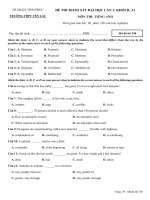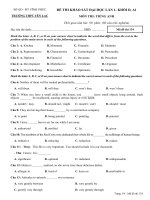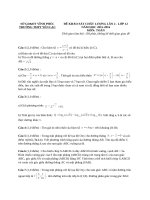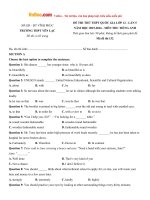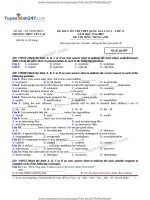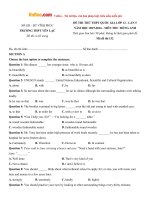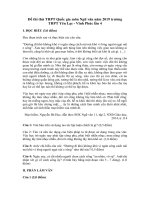Tải Đề thi khảo sát môn Tiếng Anh lớp 11 trường THPT Yên Lạc, Vĩnh Phúc (lần 2) - Đề thi khảo sát chất lượng lớp 11 môn tiếng Anh có đáp án
Bạn đang xem bản rút gọn của tài liệu. Xem và tải ngay bản đầy đủ của tài liệu tại đây (216.95 KB, 14 trang )
<span class='text_page_counter'>(1)</span><div class='page_container' data-page=1>
<b>ĐỀ THI KHẢO SÁT CHẤT LƯỢNG ĐẦU NĂM LỚP 11</b>
<b>MÔN TIẾNG ANH NĂM HỌC 2019 - 2020</b>
<b>I. Mark the letter A, B, C, or D to indicate the word whose underlined part differs from the</b>
<i><b>other three in pronunciation in each of the following questions.</b></i>
<b>Question 1: A. commerce</b> <b>B. advertise</b> <b>C. dance</b> <b>D. house</b>
<b>Question 2: A. competition B. solution</b> C. prosperity D. population
<b>II. Mark the letter A, B, C, or D to indicate the word that differs from the other three in the</b>
<i><b>position of the primary stress in each of the following questions.</b></i>
<b>Question 3: A. implement</b> <b>B. promotion</b> <b>C. contestant</b> <b>D. ambition</b>
<b>Question 4: A. monotonous B. hilarious</b> C. economic D. collaborate
<b>Question 5: A. applicable</b> <b>B. spiritual</b> <b>C. advertising</b> <b>D. industrial</b>
<b>III. Mark the letter A, B, C, or D to indicate the word(s) CLOSEST in meaning to the</b>
<i><b>underlined word(s).</b></i>
<b>Question 6: The teacher offered bonus points as an incentive to completing the homework</b>
<b>A. a goal</b> <b>B. a stimulus to action</b> <b>C. a deterrent</b> <b>D. a valuable</b>
<b>Question 7: Elephants will become extinct if man continues killing them.</b>
<b>A. die of</b> <b>B. die out</b> <b>C. die away</b> <b>D. die down</b>
<b>Question 8: He’s fully occupied with work and cannot possible see you now.</b>
<b>A. very interested in</b> <b>B. concerned with</b> <b>C. up to his ears in</b> <b>D. not involved with</b>
<b>IV. Mark the letter A, B, C, or D to indicate the word(s) OPPOSITE in meaning to the </b>
<i><b>underlined word(s).</b></i>
<b>Question 9: His physical condition was not an impediment to his career as a violinist</b>
<b>A. obstruction</b> <b>B. hindrance</b> <b>C. furtherance</b> <b>D. setback</b>
<b>Question 10: The ship went down although strenuous efforts were made to save it.</b>
<b>A. half-hearted</b> <b>B. forceful</b> <b>C. exhausting</b> <b>D. energetic</b>
</div>
<span class='text_page_counter'>(2)</span><div class='page_container' data-page=2>
<b>Question 11: After studying all the new materials, the student was able to rise his test score by</b>
twenty-five point.
<b> A. the new B. studying C. was able D. rise</b>
<b>Question 12: Sleeping alone in her room, the strange noise frightened her.</b>
<b> A. Sleeping alone B. her C. frightened D. in</b>
<b>Question 13: Some studies show that young babies prefer the smell of milk to those of other</b>
liquids.
<b> A. liquids B. prefer C. those D. Some</b>
<b>Question 14: Only when black bear has been spotted by the forest rangers will this portion of the</b>
park be closed down.
<b> A. black bear B. will C. been D. closed</b>
<b>Question 15: What we know about certain diseases are still not sufficient to prevent them from</b>
spreading easily among the population.
<b> A. from B. are C. What we know about D. among</b>
<b>VI. Mark the letter A, B, C, or D to indicate the sentence that is closest in meaning to the</b>
<i><b>sentence given.</b></i>
<b>Question 16: </b><i>My family went to the cinema last night, but the film was not interesting.</i>
<b>A. I wish my family have gone to the cinema last night.</b>
<b>B. I wish my family hadn't gone to the cinema last night.</b>
<b>C. I wish my family went to the cinema last night.</b>
<b>D. I wish my family could go to the cinema last night.</b>
<b>Question 17: </b><i>He would prefer you to pay him immediately.</i>
<b> A. He’d rather to be paid immediately. B. He’d rather you pay to him immediately. </b>
<b> C. He’d rather you to pay him immediately. </b> <b>D. He’d rather you paid him immediately.</b>
<b>Question 18: </b><i>It was the worst speech he had ever made.</i>
A. He hadn’t made a better speech than it. B. He had ever made a worse speech.
</div>
<span class='text_page_counter'>(3)</span><div class='page_container' data-page=3>
<b>Question 19: “Why don’t you put an advertisement in the local paper?”</b>
<b>A. They suggested my putting an advertisement in the local paper.</b>
<b>B. They suggested me to put an advertisement in the local paper.</b>
<b>C. They suggested that I must put an advertisement in the local paper.</b>
<b>D. They suggested me should put an advertisement in the local paper.</b>
<b>Question 20: </b><i>It’s nearly sunset now and I still haven’t eaten anything since breakfast.</i>
<b>A. There hasn’t been time to eat anything since breakfast, and now it’s almost sunset.</b>
<b>B. Breakfast was the last thing that I ate and the sun will be setting soon.</b>
<b>C. I generally don’t eat anything between breakfast and sunset, as is the case today.</b>
<b>D. I’m getting hungry because it’s almost evening and I haven’t even eaten breakfast today.</b>
<b>VII. Mark the letter A, B, C, or D on your answer sheet to indicate the sentence that is</b>
<i><b>produced from the sets of words or phrases</b></i>
<b>Question 21:</b><i> party/ be much / interest / than / I expect.</i>
<b>A. The party was much more interested than I had expected.</b>
<b>B. The party was much more interesting than I expect.</b>
<b>C. The party was much interesting than I had expected.</b>
<b>D. The party was much more interesting than I had expected.</b>
<b>Question 22: </b><i>I / rather / you / not make / noise.</i>
<b>A. I’d rather you didn’t make so many noise.</b>
<b>B. I had rather you didn’t make so much noise.</b>
<b>C. I would rather you didn’t make so much noise.</b>
<b>D. I’d rather you not make so much noise.</b>
<b>Question 23:</b><i> big / problem / face / youth / unemployed.</i>
<b>A. One of the biggest problem facing the youth today is unemployment.</b>
<b>B. One big problem facing the youth today is unemployed.</b>
</div>
<span class='text_page_counter'>(4)</span><div class='page_container' data-page=4>
<b>D. Big problem faced by the youth today is unemployment.</b>
<b>VIII. Mark the letter A, B, C, or D to indicate the correct answer in each of the following</b>
<i><b>questions.</b></i>
<b>Question 24: He didn't get the job ... he had all the necessary qualifications.</b>
<b>A. so</b> <b>B. therefore</b> <b>C. however</b> <b>D. although</b>
<b>Question 25: I don't suppose you like pineapples, ...?</b>
<b>A. do I</b> B. do you C. don't I <b>D. don't you</b>
<b>Question 26: An ... depression is a period when there are few goods and services and many </b>
people are poor or without jobs.
<b> A. economically B. economy</b> <b>C. economical</b> <b>D. economic</b>
<b>Question 27: I was invited to ... dinner at their home yesterday.</b>
<b>A. /</b> <b>B. an</b> <b>C. the</b> <b>D. a</b>
<b>Question 28: Remember ... goodbye to the interviewer before you leave the office.</b>
<b>A. saying</b> <b>B. to say</b> <b>C. talking</b> <b>D. to talk</b>
<b>Question 29: By the end of the 21st century, scientists ... cures for fatal diseases such as</b>
cancers and HIV.
<b>A. are going to find</b> <b>B. will be finding</b> <b>C. will find</b> <b>D. will have found</b>
<b>Question 30: I would like to live in a healthy environment with ... noise and pollution.</b>
<b>A. more</b> <b>B. lesser</b> <b>C. fewer</b> <b>D. less</b>
<b>Question 31: Sandra doesn't ... her roommate. They often have quarrels.</b>
<b>A. look down on</b> <b>B. make up for</b> <b>C. do away with</b> <b>D. get on well with</b>
<b>Question 32: She is the person ... I'm interested.</b>
<b>A. who</b> <b>B. in whom</b> <b>C. whom</b> <b>D. in who</b>
<b>Question 33: After he had finished high school, he applied for a/an ... course at university.</b>
<b> A. graduate B. graduating C. postgraduate D. undergraduate</b>
<b>Question 34: He put his hands …… his eyes because he couldn’t bear to watch.</b>
</div>
<span class='text_page_counter'>(5)</span><div class='page_container' data-page=5>
<b>Question 35: Our company believes it is the best ... to handle the account</b>
<b>A. organizing</b> <b>B. organizational</b> <b>C. organization</b> <b>D. disorganization</b>
<b>Question 36: Tom can't stand ... to do his homework at weekend.</b>
<b>A. to ask</b> <b>B. asking</b> <b>C. being asked</b> <b>D. to be asked</b>
<b>Question 37: Many people ... homeless after the earthquake received help from the local</b>
authorities.
<b>A. had become</b> <b>B. became</b> <b>C. who become</b> <b>D. becoming</b>
<b>Question 38: Anna: "Laura is watching a cartoon on TV at the moment."</b>
<b> Bobby: "Really? She ... to be doing her homework now."</b>
<b>A. is supposed</b> <b>B. obliges</b> <b>C. is obliged</b> <b>D. supposes</b>
<b>Question 39: The majority of students in our college ... volunteer work.</b>
<b>A. is taking part in</b> <b>B. takes part in</b> <b>C. have taken part in</b> <b>D. has taken part in</b>
<b>Question 40: Read these facts about ……species and discuss the question below.</b>
<b>A. danger</b> <b>B. endanged</b> <b>C. dangerous</b> <b>D. endangered</b>
<b>Question 41: ... for a finance company for many years, he started his own business.</b>
<b>A. Worked</b> <b>B. Have worked</b>
<b>C. Having worked</b> <b>D. Having been worked</b>
<b>Question 42: If he ... his father's advice in the first place, he ... now.</b>
<b>A. had taken/ wouldn't regret</b> <b>B. took/ wouldn't regret</b>
<b>C. had taken/ wouldn't have regretted</b> <b>D. takes/ won't regret</b>
<b>Question 43: We know that such data will prove…….. for researchers.</b>
<b>A. value</b> <b>B. valuable</b> <b>C. valued</b> <b>D. invaluable</b>
<b>Question 44: Most of the time, my two younger brothers are well-behaved but they are</b>
sometimes...
<b>A. obedient</b> <b>B. mischievous</b> <b>C. hard-working</b> <b>D. caring</b>
<b>Question 45: He ... physics at this school since he graduated from university.</b>
</div>
<span class='text_page_counter'>(6)</span><div class='page_container' data-page=6>
<b>Question 46: Do you know that representatives of the company claim their plan will be ……. to</b>
local needs.
<b>A. sense</b> <b>B. sensitive</b> <b>C. sensible</b> <b>D. senseless</b>
<b>Question 47: ... are people who always expect bad things to happen.</b>
<b>A. Optimistics</b> <b>B. Optimists</b> <b>C. Pessimists</b> <b>D. Pessimistics</b>
<b>Question 48: Anna: "Your last essay was much better, John." Bobby: "..."</b>
<b>A. Certainly!</b> <b>B. I though it was the best of all.</b>
<b>C. Thanks. That's encouraging.</b> <b>D. Do you think so?</b>
<b>IX. Read the following passage and mark the letter A, B, C, or D to indicate the correct answer</b>
<i><b>to each of the questions.</b></i>
Cooperation is the common endeavor of two more people to perform a task of reach a
jointly cherished goad. Like competition and conflict, there are different forms of cooperation,
based on group organization and attitudes. In this form, known as primary cooperation, group and
individual fuse. The group contains nearly all of each individual's life. The rewards of the
group's work are share with each number. There is an interlocking identity of individual, group,
and task performed. Means and goals become one, for cooperation itself is valued.
While primary cooperation is most often characteristic of preliterate societies, secondary
cooperation is characteristic of many modern societies. In secondary cooperation, individuals
devote only part of their lives to the group. Cooperation itself is not a value. Most member of the
group fell loyalty, but the welfare of the group is not the first consideration. Members perform
tasks so that they can separately enjoy the fruits of their cooperation in the form of salary,
prestige, or power. Business offices and professional athletic teams are example of secondary
cooperation. In the third type, called tertiary cooperation or accommodation, latent conflict
underlies the share work. The attitudes of the cooperation parties are purely opportunistic; the
organization is loose and fragile. Accommodation involve common means cease to aid achieve
antagonistic goals; it breaks when the <b>common</b> means cease to aid each party in reaching its
goals. This is not, strictly speaking, cooperation at all, and hence the somewhat contradictory
term antagonistic cooperation is sometimes used for this relationship.
<b>Question 49: Which of the following statements about primary cooperation is supported by </b>
information in passage?
</div>
<span class='text_page_counter'>(7)</span><div class='page_container' data-page=7>
B. It is usually the first stage of cooperation achieved by a group individuals attempting to
cooperate.
C. It is an idea that can never be achieved.
D. It is most commonly seen among people who have not yet developed reading and writing
skills.
<b>Question 50: The word "cherished" in the passage is closest meaning to</b>
A. prized B. set up C. agreed on D. defined
<b>Question 51: Which of the following is an example of the third from of cooperation as it is </b>
defined in the paragraph?
A. Students form a study group so that all of them can improve their grades.
B. A new business attempts to take customers away from an established company.
C. Two rival political parties temporarily work together to defeat a third party.
D. Members of a farming community share work and the food that they grow.
<b>Question 52: As used throughout the passage, the term common is closest in meaning to which </b>
of the following?
A. Popular B. Ordinary C. Vulgar D. Shared
<b>Question 53: What is the author's main purpose in the first paragraph of the passage?</b>
A. To offer a brief definition of cooperation
B. To explain how cooperation differs from competition and conflict
C. To show the importance of group organization and attitudes.
D. To urge readers to cooperate more often
<b>Question 54: The word "fragile" in the passage is closest in meaning to</b>
A. poorly planned B. inefficient C. easily broken D. involuntary
<b>Question 55: According to the passage, why do people join groups that practice secondary </b>
cooperation?
</div>
<span class='text_page_counter'>(8)</span><div class='page_container' data-page=8>
C. To experience the satisfaction of cooperation.
D. To associate with people who have similar backgrounds.
<b>Question 56: Which of the following best describes the overall organization of the passage?</b>
A. The author describes a concept by analyzing its three forms.
B. The author compares and contrasts two types of human relation.
C. The author presents the points of view of three experts on the same topic.
D. The author provides a number of concrete examples and then draws a conclusion.
<b>Question 57: The word "fuse" in the passage is closest in meaning to</b>
A. evolve B. unite C. react D. explore
<b>Question 58: Which of the following is NOT given as a name for the third type of cooperation?</b>
A. Latent conflict B. Tertiary cooperation
C. Antagonistic cooperation D. Accommodation
<b>X. Read the following passage and mark the letter A, B, C, or D to indicate the correct answer</b>
<i><b>to each of the questions.</b></i>
For 150 years scientists have tried to determine the solar constant, the amount of solar
energy that reaches the Earth. Yet, even in the most cloud-free regions of the planet, the solar
constant cannot be measured precisely. Gas molecules and dust particles in the atmosphere
absorb and scatter sunlight and prevent some wavelengths of the light from ever reaching the
ground.
With the advent of satellites, however, scientists have finally been able to measure the
Sun’s output without being impeded by the Earth’s atmosphere. Solar Max, a satellite from the
national Aeronautics and Space Administration (NASA), has been measuring the Sun’s output
since February 1984. Although a malfunction in the satellite’s control system limited its
observation for a few years, the satellite was repaired in orbit by astronauts from the space shuttle
in 1984. Max’s observations indicate that the solar constant is not really constant after all.
</div>
<span class='text_page_counter'>(9)</span><div class='page_container' data-page=9>
relatively dark regions on the Sun’s surface that have strong magnetic fields and a temperature
about 2,000 degrees Fahrenheit cooler than the rest of the Sun’s surface. Particularly large
fluctuations in the solar constant have coincided with the sightings of the large sunspot groups. In
1980, for example, Solar Max’s instruments, registered a 0.3 percent drop in the solar energy
reaching the Earth. At the same time a sunspot group covered about 0.6 percent of the solar disk,
an area 20 times larger than the Earth’s surface.
Long-term variations in the solar constant are more difficult to determine. Although Solar
Max’s data have indicated a slow and steady decline in the Sun’s output, some scientists have
thought that the satellite’s aging detectors might have become less sensitive over the years, thus
falsely indicating a drop in the solar constant. This possibility was dismissed, however, by
comparison Solar Max’s observations with data from a similar instrument operating on NASA’s
Nimbus 7 weather satellite since 1978.
<b>Question 59: The attempt to describe the solar constant can be best described as ...</b>
<b>A. an issue that has been resolved.</b>
<b>B. an ongoing research effort.</b>
<b>C. a question that can never be answer.</b>
<b>D. historically interesting, but irrelevant to contemporary concerns.</b>
<b>Question 60: What does the author mention “gas” and “dust” in paragraph 1?</b>
<b>A. The interfere with accurate measurement of the solar constant.</b>
<b>B. Scientific equipment is ruined by gas and dust.</b>
<b>C. They magnify the solar constant.</b>
<b>D. They are found it varying concentrations.</b>
<b>Question 61: The word “detected” in paragraph 3 is closest meaning to ... .</b>
<b>A. estimated</b> <b>B. disregarded</b> <b>C. registered</b> <b>D. predicted</b>
<b>Question 62: The word “its” in paragraph 2 refers to ...</b>
<b>A. malfunction</b> <b>B. satellite</b> <b>C. orbit</b> <b>D. atmosphere</b>
<b>Question 63: Why did scientists think that Solar Max might be giving unreliable information?</b>
<b>A. Solar Max did not work for the first few years.</b>
</div>
<span class='text_page_counter'>(10)</span><div class='page_container' data-page=10>
<b>C. The space shuttle could not fix Solar Max’s instruments.</b>
<b>D. Nimbus 7 interfered with Solar Max’s detectors.</b>
<b>Question 64: According to the passage, scientists believe variations in the solar constant are</b>
related to ...
<b>A. unusual weather patterns</b> <b>B. sunspot activity</b>
<b>C. increased the level of dust</b> <b>D. fluctuations in the Earth’s temperature</b>
<b>Question 65: What does this passage mainly discuss?</b>
<b>A. The interaction of sunlight and air pollution.</b>
<b>B. The launching of weather satellite.</b>
<b>C. The measurement of variations in the solar constant.</b>
<b>D. The components of the Earth’s atmosphere.</b>
<b>Question 66: The phrase “This possibility” in the last paragraph refers to the likelihood that</b>
the ...
<b>A. solar constant has declined.</b> <b>B. Nimbus 7 satellite is older than Solar Max.</b>
<b>C. solar constant cannot be measured.</b> <b>D. instruments are providing inaccurate data.</b>
<b>Question 67: Why is not impossible to measures the solar constant accurately without a satellite?</b>
<b>A. The Earth is too far from the sun.</b>
<b>B. There are not enough sunlight during the day.</b>
<b>C. The Earth’s atmosphere interfere with the sunlight.</b>
<b>D. Some areas on Earth receive more solar energy than others.</b>
<b>Question 68: The word “scatter” in paragraph 1 is closest meaning to...</b>
<b>A. disperse</b> <b>B. hit</b> <b>C. capture</b> <b>D. transform</b>
<b>XI. Read the following passage and mark the letter A, B, C, or D to choose the word or phrase</b>
<i><b>that best fits each of the blanks.</b></i>
</div>
<span class='text_page_counter'>(11)</span><div class='page_container' data-page=11>
devise ways of taking your mind off the journey, for an aeroplane gets you to your (73)...
rapidly. For a few hours, you settle back in a deep armchair to enjoy the flight. You can
(74)... a free film show or sip champagne on some services. But even when such luxuries
are not available, there is plenty to (75)... you occupied. An aeroplane offers you unusual and
breathtaking view of the world. You fly (76)... high mountains and deep valleys. If the
landscape (77) ... from view, you can enjoy the extraordinary sight of unbroken cloud plains
that stretch out for miles before you. The journey is so smooth (78)... there is nothing to
prevent you from reading or sleeping. However you decide to spend your time, one thing is
certain: you will arrive at your destination fresh and on time.
<b>Question 69: A. reputation</b> <b>B. knowledge</b> <b>C. idea</b> <b>D. famous</b>
<b>Question 70: A. kind</b> <b>B. form</b> <b>C. type</b> <b>D. sway</b>
<b>Question 71: A. face</b> <b>B. match</b> <b>C. suitable</b> <b>D. combine</b>
<b>Question 72: A. spending</b> <b>B. job</b> <b>C. story</b> <b>D. experience</b>
<b>Question 73: A. destination</b> <b>B. place</b> <b>C. arrival</b> <b>D. departure</b>
<b>Question 74: A. show</b> <b>B. look at</b> <b>C. watch</b> <b>D. observe</b>
<b>Question 75: A. stay</b> <b>B. feel</b> <b>C. behind</b> <b>D. keep</b>
<b>Question 76: A. over</b> <b>B. on</b> <b>C. below</b> <b>D. beneath</b>
<b>Question 77: A. hides</b> <b>B. is hiding</b> <b>C. hid</b> <b>D. is hidden</b>
<b>Question 78: A. that</b> B. as C. which D. for
<b>XII. Mark the letter A, B, C, or D on your answer sheet to indicate the sentence that best</b>
<i><b>combines each pair of sentences in the following questions.</b></i>
<b>Question 79: </b><i>The Prime Minister set up a committee of financial experts. They were to help him</i>
<i>discuss and formulate the policies.</i>
<b> A. A committee consisting of financial experts who were helped by the Prime Minister</b>
discussed and formulated new policies.
<b> B. A committee of financial experts was set up by the Prime Minister to help him discuss and </b>
formulate new policies.
</div>
<span class='text_page_counter'>(12)</span><div class='page_container' data-page=12>
<b> D. The Prime Minister, who is a financial expert, set up a committee to discuss and formulate</b>
new policies.
</div>
<span class='text_page_counter'>(13)</span><div class='page_container' data-page=13>
36 C
37 D
38 A
39 C
40 D
41 C
42 A
43 D
44 B
45 B
46 B
47 C
48 C
49 D
50 A
51 C
52 D
53 A
54 C
55 B
56 A
57 B
58 A
59 B
60 A
61 C
62 B
63 B
64 B
65 C
66 D
67 C
68 A
69 A
70 B
71 B
72 D
73 A
74 C
75 D
76 A
77 D
78 A
79 B
80 A
Mời bạn đọc tham khảo thêm tài liệu Tiếng Anh lớp 11 tại đây:
</div>
<span class='text_page_counter'>(14)</span><div class='page_container' data-page=14></div>
<!--links-->

